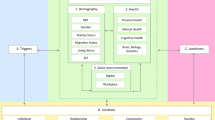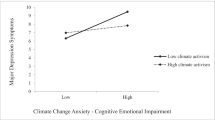Abstract
This study investigates a theorized link between Latino immigrants’ experience of acculturative stress during their two initial years in the United States (US) and declines in family cohesion from pre- to post-immigration contexts. This retrospective cohort study included 405 adult participants. Baseline assessment occurred during participants’ first 12 months in the US. Follow-up assessment occurred during participants’ second year in the US. General linear mixed models were used to estimate change in family cohesion and sociocultural correlates of this change. Inverse associations were determined between acculturative stress during initial years in the US and declines in family cohesion from pre-immigration to post-immigration contexts. Participants with undocumented immigration status, those with lower education levels, and those without family in the US generally indicated lower family cohesion. Participants who experienced more acculturative stress and those without family in the US evidenced a greater decline in family cohesion. Results are promising in terms of implications for health services for recent Latino immigrants.
Similar content being viewed by others
References
Arbona C, Olvera N, Rodriguez N, Hagan J, Linares A, Wiesner M. Acculturative stress among documented and undocumented Latino immigrants in the United States. Hisp J Behav Sci. 2010;32(3):362–84.
Berry JW. Acculturative stress. In: Wong PTP, Wong LCJ, editors. Handbook of multicultural perspectives on stress and coping. Dallas: Spring Publications; 2006. p. 287–98.
Rudmin FW: Catalogue of acculturation constructs: descriptions of 126 taxonomies, 1918–2003. Online Readings in Psychology and Culture, Unit 8. 2009; http://scholarworks.gvsu.edu/orpc/vol8/iss1/8. Accessed February 20, 2012.
Cabassa LJ. Measuring acculturation: where we are and where we need to go. Hisp J Behav Sci. 2003;25(2):127–46.
Marsiglia FF, Parsai P, Kulis S. The Southwest Interdisciplinary Research Center. Effects of familism and family cohesion on problem behaviors among adolescents in Mexican immigrant families in the Southwest US. J Ethnic Cultur Divers Soc Work. 2009;1:203–20.
Rivera FI, Guarnaccia PJ, Mulvaney-Day N, Lin JY, Torres M, Alegria M. Family cohesion and its relationship to psychological distress among Latino groups. Hisp J Behav Sci. 2008;30:357–78.
Crockett LJ, Iturbide MI, Torres Stone RA, McGinley M, Raffaelli M, Carlo G. Acculturative stress, social support, and coping: relations to psychological adjustment among Mexican American college students. Cultur Divers Ethnic Minor Psychol. 2007;13:347–55.
Lara M, Gamboa C, Kahramanian MI, Morales LS, Hayes Bautista DE. Acculturation and Latino health in the United Status: a review of the literature and its sociopolitical context. Annu Rev Public Health. 2005;26(1):367–97.
Hovey JD, Magana CG. Psychosocial predictors of anxiety among immigrant Mexican migrant farmworkers: implications for prevention and treatment. Cultur Divers Ethnic Minor Psychol. 2002;8:274–89.
Miranda AO, Matheny KB. Socio-psychological predictors of acculturative stress among Latino adults. J Mental Health Counseling. 2000;22(4):306–17.
Perez MC, Fortuna L. Psychosocial stressors, psychiatric diagnoses and utilization of mental health services. J Immigr Refug Serv. 2005;3:107–24.
Torres L, Driscoll MW, Voell M. Discrimination, acculturation, acculturative stress, and Latino psychological distress: a moderated mediational model. Cultur Divers Ethnic Minor Psychol. 2012;18(1):17–25.
Cervantes R, Goldbach J, Santos SM. Familia adelante: a multi-risk prevention intervention for Latino families. J Prim Prev. 2011;32(3–4):225–34.
Cervantes RC, Cordova D. Life experiences of Hispanic adolescents: developmental and language considerations in acculturation stress. J Community Psychol. 2011;39:336–52.
Baer J. Is family cohesion a risk or protective factor during adolescent development? J Marriage Families. 2002;64:668–75.
Miranda AO, Estrada D, Firpo-Jimenez M. Differences in family cohesion, adaptability, and environment among Latino families in dissimilar stages of acculturation. Family J. 2000;8:341–50.
Manzi C, Vignoles VL, Regalia C, Scabini E. Cohesion and enmeshment revisited: differentiation, identity, and well-being in two European cultures. J Marriage Family. 2006;68(3):673–89.
Schwartz SJ. The applicability of familism to diverse ethnic groups: a preliminary study. J Soc Psychol. 2007;147:101–18.
Hovey JD, King CA. Acculturative stress, depression, and suicidal ideation among immigrant and second-generation Latino adolescents. J Am Acad Child Adolesc Psychiatry. 1996;35:1183–92.
Schwartz SJ, Unger JB, Zamboanga BL, Szapocznik J. Rethinking the concept of acculturation: implications for theory and research. Am Psychol. 2010;65:237–51.
Gallo LC, Penedo FJ, Espinosa de los Monteros K, Arguelles W. Resiliency in the face of disadvantage: do Hispanic cultural characteristics protect health outcomes? J Pers. 2009;77:1467–94.
Warner LA, Valdez A, Vega WA, De La Rosa M, Turner RJ, Canino G. Hispanic drug abuse in an evolving cultural context: an agenda for research. Drug Alcohol Dependence. 2006;84:S8–16.
Bogenschneider K. An ecological risk/protective theory for building prevention programs, policies, and community capacity to support youth. Fam Relat. 1996;45:127–38.
Bronfenbrenner U. Ecology of the family as a context for human development: research perspectives. Developmental Psychol. 1986;22:723–42.
Szapocznik J, Coatsworth JD. An ecodevelopmental framework for organizing risk and protection for drug abuse: a developmental model of risk and protection. In: Glantz M, Hartel CR, editors. Drug abuse: origins and interventions. Washington, DC: American Psychological Association; 1999. p. 331–66.
Overbeek G, Stattin H, Vermulst A, Ha T, Engels RCME. Parent-child relationships, partner relationships, and emotional adjustment: a birth-to-maturity prospective study. Developmental Psychol. 2007;43:429–37.
De La Rosa M, Dillon FR, Ganapati NE, Rojas P, Pinto E, Prado G. Mother-daughter attachment and drug abuse among Latinas in the United States. J Drug Issues. 2010;40:379–404.
Salganik MJ, Heckathorn DD. Sampling and estimation in hidden populations using respondent driven sampling. Sociol Methodol. 2003;34:193–240.
Bloom BL. A factor analysis of self-report measures of family functioning. Fam Process. 1985;24:225–39.
Cervantes RC, Padilla AM, Salgado de Snyder VN. The validity and reliability of the Hispanic Stress Inventory. Hisp J Behav Sci. 1990;12:76–84.
Tabachnick BG, Fidell LS. Using multivariate statistics. 5th ed. Boston, MA: Allyn and Bacon; 2007.
IBM SPSS Statistics (SPSS) [computer program]. Version 19. United States: IBM; 2010.
Berry JW. Immigration, acculturation, and adaptation. Appl Psychol Int Rev. 1997;46:5–34.
De La Rosa M, White MS. A review of the role of social support systems in the drug use behavior of Hispanics. J Psychoactive Drugs. 2001;33(3):233–40.
Passel JS, Cohn D: Unauthorized Immigrant Population: National and State Trends, 2010. Pew Hispanic Center 2011; http://www.pewhispanic.org/files/reports/133.pdf. Accessed February 20, 2012.
McLellan AT, Woody GE, Metzger D, McKay J, Durell J, Alterman AI, et al. Evaluating the effectiveness of addiction treatments: Reasonable expectations, appropriate comparisons. In: Egertson JA, Fox DM, Leshner AI, editors. Treating drug abusers effectively. Malden, MA: Blackwell Publishers; 1997.
Cervantes R, Goldbach J, Santos SM. Familia Adelante: a multi-risk prevention intervention for Latino families. J Prim Prev. 2011;32:225–34.
Paynter C, Estrada D. Multicultural training put into clinical practice: reflections from a Euro-American female counselor-in-training working with Mexican immigrants. Family J. 2009;17(3):213–9.
Buki LP. Reducing health disparities: the perfect fit for counseling psychology. Counseling Psychologist. 2007;35:706–15.
Tucker CM, Ferdinand LA, Mirsu-Paun A, Herman K, Delgado-Romero E, van den Berg JJ, Jones JD. The roles of counseling psychologists in reducing health disparities. Counseling Psychologist. 2007;35:650–75.
Acknowledgments
This study was supported by award number P20MD002288 from the National Institute for Minority Health and Health Disparities. The content is solely the responsibility of the authors and does not necessarily represent the official views of the National Institute on Minority Health and Health Disparities or the National Institutes of Health.
Author information
Authors and Affiliations
Corresponding author
Rights and permissions
About this article
Cite this article
Dillon, F.R., De La Rosa, M. & Ibañez, G.E. Acculturative Stress and Diminishing Family Cohesion Among Recent Latino Immigrants. J Immigrant Minority Health 15, 484–491 (2013). https://doi.org/10.1007/s10903-012-9678-3
Published:
Issue Date:
DOI: https://doi.org/10.1007/s10903-012-9678-3




